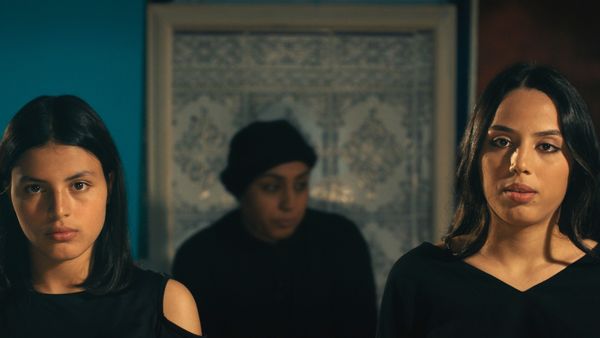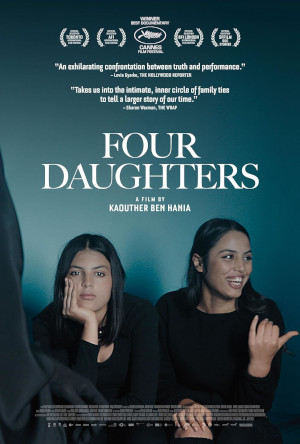Eye For Film >> Movies >> Four Daughters (2021) Film Review
Four Daughters
Reviewed by: Jennie Kermode

Sometimes the most important stories are the hardest to tell, the secrets one most wants to share too painful to speak. Olfa had four daughters. This much we know from the title, but only two are with her now. What happened to the others? As the film opens, director Kaouther Ben Hania introduces actors who will help her to explain. Actors to play the two missing daughters, an actor to play the various men who have connected with the family (just one, because all these men have let them down), and an actor to play Olfa herself at times when it all becomes too much.
Working with these actors, with Olfa and with daughters Eya and Tayssir, Ben Hania unravels the complex story through a mixture of interviews and reenactments, some of which are discussed in front of the camera before they are performed. The exposure of the film’s underlying structures in this way invites audiences to think about the processes of storytelling and interpretation, which is important, because it’s a story which took the missing women away.

At first viewers might find this process alienating. It’s not easy to get into, in part because we’re told that what follows will be difficult, but at the same time it unites us with Olfa, Eya and Tayssir as witnesses to the act of creation, and thus positions us alongside them as ordinary, relatable people to whom something extraordinary is happening. To whom something extraordinary happened in the past. It encourages us to listen rather than turning away or apportioning blame. It emphasises that something like this could happen in any family. Perhaps Olfa might have done some things differently, but the real genesis of the problem is external, and no parent can protect their children from all of the influences of the wider world. Indeed, Olfa thinks that her greatest mistake was to try to hold on too hard.
Rahma and Ghofran were 15 and 16, respectively, when they ran away to join Daesh. Their sisters were younger, looking up to them, impressed by their various choices. A goth phase – contentious in Tunisia, where fear of Satanism is very real – followed by a devout religious phase. Olfa tried to shield the girls from predators of every kind but sometimes missed those closest to home. She tried to instil in them the assurance that they could stand up for themselves – as she recalls having done, spectacularly, on her wedding night – but, inevitably, they stood up to her.
What happened next is less certain. It’s pieced together in fragments, news coverage startling when juxtaposed with cinematographer Farouk Laâridh’s carefully framed images. Remembering is differently traumatic. Olfa finds support from Hind Sabri, who plays her, as together they try to understand her character before and afterwards. Inevitably, there is no real resolution – not for her and not for the audience. There is, perhaps, an increased appreciation of the messiness of it all, and of the terrible ease with which malign forces can seed themselves within someone, seeming to offer an ordered approach to life. Psychological weaknesses we all have are exposed in a new way. It becomes harder to distinguish between the monstrous and the merely human – which is not to excuse but, perhaps, is the opening gambit to a conversation that could make a difference.
Reviewed on: 28 Jan 2024
















